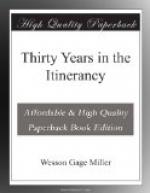The thirteenth session of the Wisconsin Conference was held Oct. 13, 1859, in the village of Whitewater, and was presided over by Bishop Ames. The year had been of less than seven months duration, as by request of the Conference, the time of holding the sessions had been changed back to the Fall. When the change was made in the first place, from Fall to Spring, it was believed by many that such an arrangement would be a benefit to the Preachers, by giving them, for the winter, the products of their gardens. But, after a trial, it was found that the roads were generally much worse in the Spring than in the fall, and if the Conferences were delayed so as to find good roads for moving, the Preachers would reach their new fields too late to plant their gardens. Hence, after trying the experiment, it was thought best to return to the Fall.
At this Conference the election of delegates to the General Conference again occurred. The slavery question was now rife, and of course this election could not be held without making it an issue. During the early part of the Conference this subject became the general theme of conversation, and, I might add, the discussions and the prayers. In short, every man who was in danger of being struck with a vote must certainly show his colors on the slavery issue. An able Committee was formed, and a careful report rendered. And when the vote was taken on the report, all eyes were on the alert to see how each candidate voted.
As the Report on Slavery is not lengthy, I will insert it as taken from the Conference Minutes:
1. That the
assertion that the M.E. Church is constitutionally
pro-slavery, whether
that assertion be made by our professed
friends or by our enemies,
is a base slander.
2. That we
recommend to the next General Conference so
to change the General
Rule on Slavery as to prohibit the buying
selling or holding a
human being as a slave.
3. That we
concur with the Providence Conference in recommending
to the next General
Conference so to change the General Rule
on Slavery as to read:
’Slavery, the buying or selling of men,
women or children, with
an intention to enslave them.’
4. That we
concur with the Erie Conference in recommending
to the next General
Conference so to change the General Rule on
Slavery as to read:
’The buying, selling, holding or transferring
of a human being, to
be used in slavery.’
It will be observed that the Wisconsin Conference preferred the wording of her own proposed Rule, yet such was her anxiety to secure action by the General Conference, that she was willing to adopt any other form of words, if the same sentiment should be explicitly incorporated. And by concurring in those sent from the Providence and Erie Conferences, and at the same time re-affirming her own, which was going the circuit of the other Conferences, she hoped to see some one of them reach the approaching General Conference, with the recommendation of a sufficient number of the Annual Conferences, to make it a law at once on the action of that body. With this intense interest thrown around the subject, it is not a matter of surprise that the votes of the candidates, on the adoption of the report, were carefully watched.




